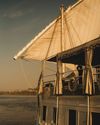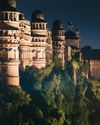
“Is Istanbul always this beautiful?” I ask our guide Ekrem Korkmaz, who smiles back. The light suffusing Eminönü harbour is turning the pier incandescent; it seems to catch on to everything and hold tight. We hop on the ferry to Üsküdar district on the Asian side of the city, which is split from Eminönü by the hyper-real, intoxicating blues of the Bosphorus Strait.
The half-hour ride is the difference between Asia and Europe—or, as celebrated Ottoman architect Mimar Sinan may have put it, between the sun and the moon. Approaching Üsküdar, my eye fixes on Mihrimah Sultan Mosque, shining white like a beacon by the jetty. The mosque was built by Sinan on commission from Suleyman the Magnificent, the longest-reigning sultan of the Ottoman Empire. It was made for his daughter Mihrimah, whose name means ‘sun and moon’.
As the story goes, Sinan was in love with the princess and later quietly built a twin mosque on the European side. It’s said that on her birthday on 21 March, the sun sets behind this mosque just as the moon rises behind the Asian one. Legend or not, the romance of it gives me goosebumps.
We encounter legends everywhere on our weeklong trip. In southeastern Anatolia, we traverse land linked to the Garden of Eden, in the Fertile Crescent where Abraham, father of three monotheistic religions, was born. On a cruise to the dam-drowned medieval city of Old Halfeti, we pass a castle where St John is said to have made copies of the Bible and hidden them. A few hours later at Mount Nemrut, we watch the sun rise over a spectacular, crumbling tomb built by a king who equated himself with the gods. We pause in Konya in central Anatolia, home to Sufi poet Rumi. We finish at Istanbul by the Bosphorus, which Greek mythology’s Jason and Medea sailed in search of the Golden Fleece.
Diese Geschichte stammt aus der December - January 2020-Ausgabe von Condé Nast Traveller India.
Starten Sie Ihre 7-tägige kostenlose Testversion von Magzter GOLD, um auf Tausende kuratierte Premium-Storys sowie über 8.000 Zeitschriften und Zeitungen zuzugreifen.
Bereits Abonnent ? Anmelden
Diese Geschichte stammt aus der December - January 2020-Ausgabe von Condé Nast Traveller India.
Starten Sie Ihre 7-tägige kostenlose Testversion von Magzter GOLD, um auf Tausende kuratierte Premium-Storys sowie über 8.000 Zeitschriften und Zeitungen zuzugreifen.
Bereits Abonnent? Anmelden

Made In Nagaland
From home textiles to jewellery, clothing, and more, here are the 10 Naga craft brands you need to know. By Sohini Dey

TOKYO RIGHT NOW
As impossible to pigeonhole as ever, the Japanese capital is buzzing with fresh influences and new ideas

RAISING RAI: WHERE THE MAGIC HAPPENS
Raghu and Avani Rai on connecting via worlds seen through their lenses.

GILDED WATERS
Paula Hardy boards one of the last remaining dahabiyas on the Nile for a different perspective of Egypt's storied river

THE GIRL WITH GRAND DESIGNS
Gauravi Kumari is part of Jaipur's new creative set that is bringing fresh perspectives to the city's design legacy.

A FACE FOR ADVENTURE
Retooling the iconic Rolex GMT-Master II for fresh explorations.

THE GRAND seduction
Palermo's chaos, swagger, and temperamental charm cast a hypnotic spell.

Rhythm Divine
Wherever you go in Gwalior, the myth and magic of Tansen are inescapable, as Sam Dalrymple finds out.

IDEAL WORLD
Palestinian chef Fadi Kattan explains why he went ahead with the publication of Bethlehem, his celebratory cookbook.

NUJUMA, A RITZ-CARLTON RESERVE SAUDI ARABIA
On alittle-visited Red Sea archipelago, the Middle East’s first Ritz-Carlton Reserve reflects both untapped nature and hyperreal modernity, finds Noo Saro-Wiwa.